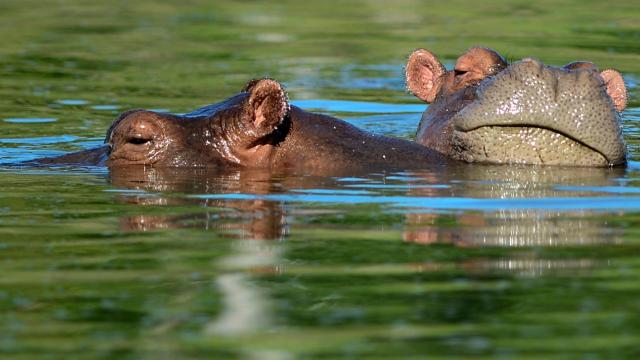I’ve got my eyes on the biggest news of the day. That’s right: the fate of Pablo Escobar’s hippos.
Scientists published a study in the journal Biological Conservation earlier this month warning that the hippopotamuses imported by the cocaine kingpin decades ago are taking over Colombia’s marshlands, and that situation will get far worse if officials don’t get rid of the creatures.
In case you need a refresher, the Colombian National Police killed Pablo Escobar in 1993. When they did so, they seized his 2,800 hectare ranch, including his personal zoo. But while they sent most of Escobar’s animals to live in other zoos and wildlife preserves, they left his four fully grown cocaine hippos alone, even though they’re not native to the region. Those four reproduced, and now there’s roughly 80 hippos roaming around the country, having become something of a national mascot.
The hippos, which the report says are “the largest invasive animal in the world,” are wreaking havoc on the country’s ecosystems. Last year, research showed that the animals’ crap was changing local waterways’ chemistry and oxygen levels, fertilizing harmful cyanobacteria, which can lead to blue-green algae blooms that make people and animals sick. The hippos have also been a direct safety threat to Colombians, chasing them around and even seriously injuring one man in May 2020. Globally, hippopotamuses kill more people each year than any other large mammal species. You simply don’t mess with hippos.
The animals continue to reproduce and face no natural predators in Colombia. The animals have spread to live 160 kilometres from their original home on Escobar’s estate. They now reside all along the Magdalena River basin, which is a key source of water for drinking and economic activity like agriculture and cattle ranching.
Due to concerns about public health and safety, Colombian officials launched a plan to kill the hippos off in 2009, but they quickly abandoned it due to public outcry. The new study’s authors say that dropping the plan was a mistake. They forecast that “the population size will continue to steadily increase,” swelling to nearly 1,500 hippos by 2040. By then, the animals will begin having irreversible effects on local ecosystems and will represent a serious, out-of-control threat to human safety. To stave off an ecological catastrophe and greater public menace, the paper urges officials to once again consider culling the hippos before reaching that point.
Not everyone is on board with reopening the conversation about killing the hippos. Some scientists think we should leave the hippos alone — or at least continue to study their impacts on the ecosystem without judgment. A paper last year indicated that the animals have actually been beneficial to Colombia’s environment, filling ecological roles once played by ancient notoungulates, which have been extinct for thousands of years.
“We do not claim that hippos are beneficial or not — but that they should be studied without those types of labels, in the context of deep time,” an author of that study said at the time.
Still other ecologists, the new study notes, see the hippos as a problem, but think instead of killing them, they should be castrated, allowing them to live out their lives but not to reproduce. That could at least mitigate some of the backlash the last time authorities considered offing the animals, which led to protests. But as the authors note, past attempts to contain and sterilise the hippos haven’t exactly been successful, since the animals are extremely fast and violent. State scientists only managed to capture four of the animals between 2011 to 2019, which “does not seem to have an important impact on reproduction,” the authors wrote.
Whatever authorities decide to do, the authors make it clear that it’s at least time for them to get serious about researching the potential costs and benefits of all solutions. “There is an urgent need to conduct collaborative research on social conflicts caused by the hippo in Colombia,” the study says. Otherwise, more people and ecosystems are going to get hurt.
